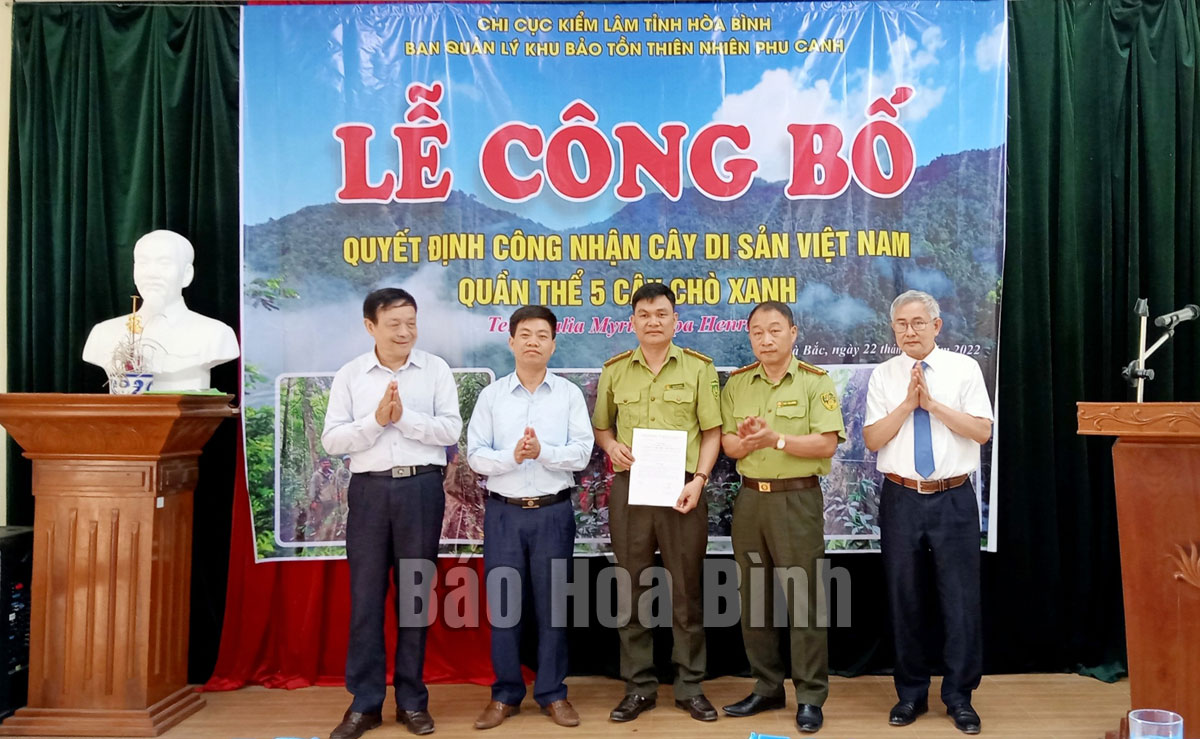
(HBO) - In the morning of April 22nd, at the Management Board of Phu Canh Nature Reserve (Da Bac), a ceremony announcing the Vietnam's heritage tree for a population of 5 Terminalia Myriocarpa Henrila (the local name is Phay tree) took place. Assoc. Prof. Dr. Tran Ngoc Hai, the Vice Chairman of Vietnam Heritage Tree Council and the leaders from the Provincial Department of Forest Protection and Da Bac district attended the announcement ceremony.

The ceremony announcing the
decision to recognize the Vietnamese heritage tree with the population of 5 Terminalia
myriocarpa Henrila at Phu Canh Nature Reserve.
The population of 5 Terminalia
Myriocarpa Henrila recognized as the Vietnamese Heritage tree is in Bua Phay
area, in lot 06, block 34, sub-zone 15. This is the bordering area of Doan Ket
and Dong Chum communes. These trees are over 200 years old, the largest tree
with a diameter of 11.1 m is over 600 years old, and the height of the tallest
tree is over 50 m. This Myriocarpa Henrila is often called as the magic Phay
tree by the local people. There are 2 routes through the forest to reach the
location of the population of the heritage trees. Route 1 starts from the
heritage tree stele in Tham Luong hamlet, Doan Ket commune with a length of 3.1
km; route 2 starts from Nhap hamlet, Dong Chum commune with a length of 4.5 km.
Currently, this route has been investigated by Phu Canh Nature Reserve,
surveying the route to discover and experience the trekking tourism.
The population of 5 Terminalia
Myriocarpa Henrila recognized as Vietnam's heritage trees, which helps the
Management Board of Phu Canh Nature Reserve set up an eco-tourism development
project to deploy eco-tourism routes and attractions, the resort in the area
assigned to manage according to the general policy of the locality. Thereby, it
has been creating conditions for the local people in the buffer zone to have
income from forests, from tourism and there is less impact on the special-use
forests.
The emulation movement "Hoa Binh joining hands to build new-style rural areas” has been widely spreading, becoming a driving force that motivates the localities to renew rural landscapes and improve the material and spiritual lives of the residents. In this movement, the people play a central role-both as the main implementers and direct beneficiaries of its outcomes.
In response to the global digital revolution, Hoa Binh Newspaper is transforming itself into a modern and multi-platform media hub, blending cutting-edge technology with a restructured newsroom and a new generation of tech-savvy journalists.
Hoa Binh province’s Association of the Elderly recently held a conference to review the project on expanding the inter-generation self-help club model until 2025.
In a move to implement Resolution No. 57-NQ/TW, issued on December 22, 2024 by the Politburo, which targets breakthroughs in science-technology development, innovation, and digital transformation, the Hoa Binh provincial Department of Health has issued a plan to roll out the "Digital Literacy for All” campaign within the local health sector.
An Nghia Commune (Lạc Sơn District) is one of the communes that achieved the tha standard of the national new rural area in 2018. Entering a new development phase, the commune is now trying to meet the criteria for the advanced new rural development. With the strong political will and the public consensus, the commune is gradually overcoming the challenges to reach this goal, aiming for the sustainable development.



